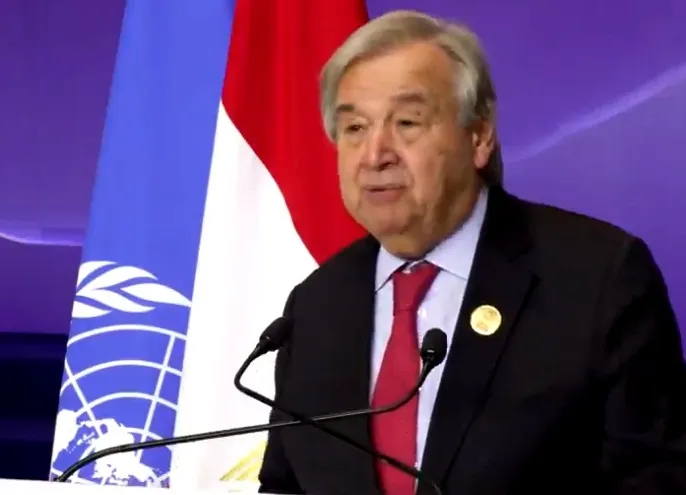How Can We Tackle the Root Causes of Maritime Insecurity?

Synopsis
On May 21, UN Secretary-General Antonio Guterres called for urgent action to tackle the root causes of maritime insecurity. He highlighted the necessity for global cooperation to address poverty, governance issues, and the need for enhanced maritime security measures. Guterres urged nations to commit to international law to preserve maritime safety and prevent criminal activities at sea.
Key Takeaways
- Addressing poverty and governance issues is key to enhancing maritime security.
- International law serves as a foundation for cooperation among nations.
- Partnerships are essential in creating effective maritime governance.
- Cybersecurity threats are a growing concern for maritime operations.
- Comprehensive strategies are required to combat piracy and organized crime.
United Nations, May 21 (NationPress) UN Secretary-General Antonio Guterres emphasized the necessity to strengthen initiatives aimed at resolving the fundamental causes of maritime insecurity.
"Challenges to maritime security cannot be effectively countered without addressing underlying factors such as poverty, the absence of viable livelihoods, insecurity, and fragile governance frameworks," he conveyed during an open debate at the Security Council.
"Within the United Nations network, we are collaborating with impoverished coastal communities to create new avenues for dignified and sustainable employment. Collectively, we need to amplify our efforts to diminish the chances that desperate individuals resort to crime and other actions that jeopardize maritime security and harm our ocean ecosystem," stated Guterres.
He further highlighted the importance of assisting developing nations in enhancing their capacity to confront these threats, through technology, training, capacity-building, judicial reforms, and modernized naval forces, marine police units, maritime surveillance, and port security.
According to Guterres, adherence to international law is the cornerstone of maritime security, as reported by the Xinhua news agency.
The international legal framework for maritime security, anchored by the UN Charter and the Convention on the Law of the Sea, maintains a delicate balance between states' sovereign rights, jurisdictions, and freedoms, and their responsibilities and obligations. It also establishes a robust cooperative framework for combating maritime crimes and ensuring accountability, he remarked.
However, Guterres cautioned that this framework's strength is directly proportional to states' commitment to its full and effective execution. "All states must fulfill their responsibilities. They must resolve any disputes regarding maritime security in line with the UN Charter," he asserted.
Guterres advocated for partnerships to bolster maritime security.
"We need to engage everyone with an interest in maritime areas," he urged. "As maritime security threats become increasingly complex and interconnected, enhanced coordination and stronger maritime governance are vital."
Without maritime security, global security is unattainable. Nonetheless, maritime areas are facing mounting pressures from both traditional threats and emerging risks, including disputes over borders, depletion of marine resources, and escalating geopolitical tensions that exacerbate competition, conflict, and crime, he noted.
No region is immune. The situation is deteriorating. Following a slight global decline in reported piracy and armed robbery incidents in 2024, the first quarter of 2025 experienced a significant increase, Guterres warned.
Reported incidents surged by nearly half (47.5 percent) compared to the same period in 2024, he stated, referencing data from the International Maritime Organisation.
Incidents in Asia nearly doubled, particularly in the Straits of Malacca and Singapore. In the Red Sea and Gulf of Aden, attacks by the Houthis in Yemen on commercial vessels have disrupted global trade and heightened tensions in an already unstable region, he observed.
The Gulf of Aden and the Mediterranean remain perilous routes for migrant smuggling and trafficking of both arms and humans. The Gulf of Guinea continues to contend with piracy, kidnappings, armed robbery at sea, oil theft, illegal, unreported, and unregulated fishing, as well as the illicit trafficking of drugs, weapons, and people.
Heroin from Afghanistan continues to infiltrate East Africa via the Indian Ocean, while cocaine traverses the coasts of the Western Hemisphere, crossing the Atlantic to reach West Africa and European ports.
Cyber-attacks represent a rapidly emerging threat to ports and shipping companies, he added.
Over the years, the Security Council has endeavored to tackle a spectrum of threats undermining maritime security and global peace, including piracy, armed robbery, trafficking, organized crime, and terrorism in the maritime domain, stated the UN chief.
The UN system stands ready to continue supporting the Security Council and all UN member states in ensuring peaceful, secure, and prosperous maritime environments for future generations, he concluded. "Let’s take decisive action to protect and secure our maritime spaces, along with the communities and individuals relying on them."









